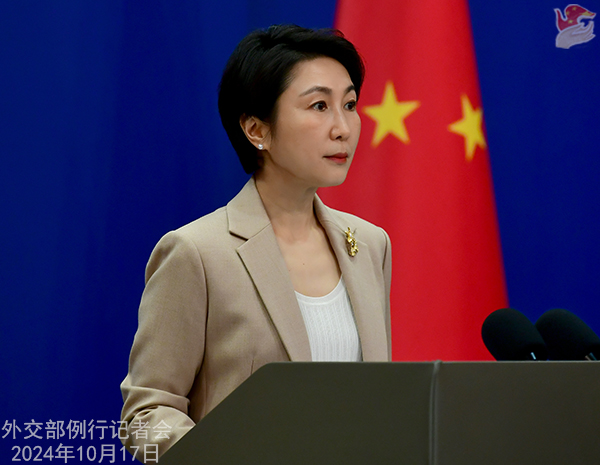The government of China has slammed the United States, U.S for allegedly “interfering” in the internal affairs of Nigeria.
China also slammed the U.S for its recent rhetoric of threatening military action and a decision to redesignate Nigeria as a “Country of Particular Concern” (CPC) over alleged religious persecution.
The decision was made known by China’s Foreign Ministry spokesperson, Mao Ning, during a press conference on Tuesday, November 4, 2025.
Ning voiced strong opposition to the statements made by U.S President Donald Trump.
She said Beijing affirmed its firm support for the Nigerian government’s chosen path of development, emphasizing the principle of non-interference in the domestic matters of sovereign nations.
Ning described Nigeria as China’s “comprehensive strategic partner,” stressing that the Chinese government stands by the West African nation amid growing international tension.
“China firmly opposes any country using religion and human rights as an excuse to interfere in other countries’ internal affairs, and threatening other countries with sanctions and force,” she said.
Pan-Atlantic Kompass reports that China slammed the U.S after Trump threatened to put “boots on the ground” if the Nigerian government failed to curb alleged Christian genocide in the country.
“If the Nigerian Government continues to allow the killing of Christians, the U.S.A. will immediately stop all aid and assistance to Nigeria, and may very well go into that now disgraced country, ‘guns-a-blazing,’ to completely wipe out the Islamic Terrorists who are committing these horrible atrocities,” he said.
“I am hereby instructing our Department of War to prepare for possible action. If we attack, it will be fast, vicious, and sweet, just like the terrorist thugs attack our CHERISHED Christians,” he added.
He ended his post with “WARNING: THE NIGERIAN GOVERNMENT BETTER MOVE FAST!”
However, the Nigerian government has continued to deny allegations of Christian genocide in the country.
Speaking on the allegations, Minister of Foreign Affairs, Yusuf Tuggar, on Tuesday said the Nigerian constitution does not allow religious persecution.
“There can’t be a religious persecution that can be supported in any way, shape, or form by the government of Nigeria at any level,” Tuggar said at a press conference in Berlin, Germany.
Tuggar added that Nigeria has a “constitutional commitment to religious freedom and rule of law”.
Tuggar warned against any attempts to divide Nigeria along religious lines, as he drew parallels with Sudan.
“What we are trying to make the world understand is that we should not create another Sudan,” he said.
“We’ve seen what has happened with Sudan with agitations for the partitioning of Sudan based on religion, based on tribal sentiments and you can see the crisis even when the partitioning was done according to religion or according to tribe,” Tuggar said.
Recall also that Nigerian President Bola Tinubu had disagreed with Trump over the designation of Nigeria as a “Country of Particular Concern” (CPC), saying that the country is not hostile to any religion.
He claimed that his administration remains committed to protecting the rights of citizens of all faiths.
Tinubu added that Nigeria stands firm as a democratic nation guided by constitutional guarantees of religious liberty for all citizens.
The Nigerian President stated: “Nigeria stands firmly as a democracy governed by constitutional guarantees of religious liberty.
“Since 2023, our administration has maintained an open and active engagement with Christian and Muslim leaders alike and continues to address security challenges that affect citizens across faiths and regions.





